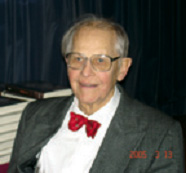
Richard N. Frye
January 10, 1920- March 27, 2014
Aga Khan Professor of Iranian, Emeritus at Harvard University, Professor Frye, since the age of twelve, pursued his fascination with subjects related to the world area he called “Greater Iran:” i.e. the Persianate and Iranian languages region of Asia. Ever since he saw a book about Tamerlane in his hometown of Danville, IL, he collected objects and books from the region that stretches from Turkey to western China. A prolific traveler, he resided for long periods abroad, knew ancient languages, spoke contemporary languages of Turks, Iranians, Afghans, Tajiks, Uzbeks as well as Russian, German, French. He learned his parents’ tongue, Swedish, later in life since they, as immigrants during the early part of the 20th century, followed the pattern of discouraging native language usage in American-born generations.
Frye’s last book, “Greater Iran: A 20th Century Odyssey,” a memoir documenting his long academic career to 2005, maps the course of modern Middle Eastern studies evolution at US campuses, his initiatives to create endowed university chairs at Columbia, Harvard, and through the National Armenian Association for Study and Research at many other universities
Graduating secondary school at 14, college at 19, and starting his graduate work at Harvard in the pre-WWII period, he joined the war effort, spent two years in Kabul, then Istanbul, with the Office of Strategic Services (precursor to the CIA), before returning to Harvard to complete his PhD in 1949. By 1957, he was established in the position he held until his retirement in 1990.
Since then he published two books to add to thirteen earlier titles, one of which, served as the basis of Michael Crichton’s “Eaters of the Dead” (film The Thirteenth Warrior). Nearly all his books have appeared in other language translations and many have gained the status of classics in their field, been reprinted many times, and continue to be in print. His personal library of some 25,000 items is housed at Boston University as part of their Special Collections. His archives are at Harvard and Boston University.
Of Frye’s many media interviews, a recent one took place in 2008 on CNN when he voiced his wish for burial in Iran at a time when Iran-US relations were particularly rocky. He stated this wish often in a variety of settings. His devotion to Iran’s rich ancient and medieval culture transcended political turmoil and he accepted honors from Mohammad Reza Shah Pahlavi as well as former Republican era President Mahmoud Ahmadinejad. His dedication to the enduring values of culture and civilization trumped political vicissitudes that have torn the Middle East and particularly the Iranian world.